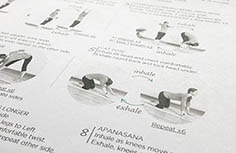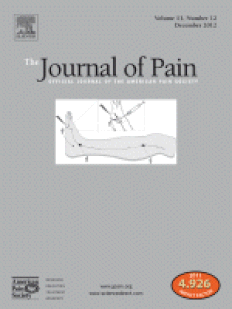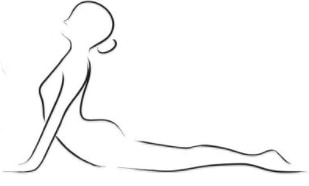 Are you good at yoga? Are you doing yoga wrong? Is there a body position you struggle against? Is there a breath technique which feels hard? Who made up the rules of yoga anyway? Rules are made up by peopleRules are made up by people. They are guidelines that probably helped someone (or many people) to gain more from their yoga practice, and so they keep being repeated and enforced in the hope that they will help you too. They are often from a book and you don't really know if the person who wrote the book would stick to that rule if they knew what happened with you when you tried to follow it. Or the rule might simply be from a bossy person who likes to tell people what to do. I do this to my kids quite often, enforce rules and boundaries, sometimes I'll seem bossy. And this has its place. Sometimes they just need to know where to start, and what to do, and how to do it. It is a good place to begin for them, and they like rules ... at first. But at some point there is a conversation about the rule, when they are ready or when they feel like that rule isn't a great idea, and the rule may well be due for an update as a result of the discussion. Or they may just need to understand what underpins the rule helps it make more sense to them. When to break the rulesRules are there to be helpful. But rules are also there to be broken / updated / changed when they aren't working.
If you come up against a rule in yoga, use it as a springboard for your own enquiry into what it does for you, or what it doesn't do for you. This doesn't give you free reign to do what you like, discipline is a powerful tool in yoga and one that I have high regard for. This is where teachers are really helpful. Someone more experienced at understanding this rule than you, with whom you can discuss it. Explore why the rule would be a helpful one for you to work with (or not). What might the rule offer that your not seeing from your viewpoint. Be prepared for an outcome either way, or if the teacher doesn't know why the rule is there, and isn't able to explore it with you, then find someone more experienced who is. Perhaps the rule is generally a good idea, or perhaps the insight you gain from the conversation and enquiry is perhaps more beneficial than the rule itself.
0 Comments
Breathing well in yoga can seem tricky As a beginner to yoga, it can seem difficult to keep the focus on the breath. It is common to find that you’ve been holding your breath and straining in some postures. Arms and legs are just about doing what the teacher has invited you to do - but your breath, well who knows? This is particularly noticeable in a fast-paced or deeply strenuous class where the body is most dominant and anything else gets left behind as you work your way through the class. So what if my breath isn't great?Day to day we typically breath 12-15 breaths per minute. The rate, depth and quality of it can help adjust our levels of anxiety and stress, our immune system effectiveness and many more physical and mental health markers. Yoga offers profound teachings in the breath if we choose to listen that can support our health, wellbeing and awareness in our day to day lives. Familiarity helps to develop our breath focusGradually, with familiarity of a regular yoga practice, we can start to remember to breathe with a flowing and calmer breath. And eventually the breath and movements start to link together more. From here we can start to take that further still and refine into a more advanced yoga practice. Once you feel you are able to link the breath and movements together, then the power of the breath can really start to be harnessed and the refinement and quality of our yoga practice can bloom. Our nervous system will feel immense benefit from working skilfully with breath centring and we can move beyond the endorphin highs of vigorous and strenuous yoga practice and move towards maturing our yoga practice. The breath powers our yoga practiceSounds obvious, of course we need to breath to power everything that we do or we’ll collapse in a heap. But it is easy to forget about the quality of our breath when distracted or physically strained. What if you eased back from the strain and found a spaciousness in the breath to develop the power of your yoga practice instead? What would that feel like? What could it do to your yoga practice? What if we found our physical alignment from our breath?We often listen to the technical instruction from the yoga teacher: move your foot here, rotate your hip there, etc... Breath-centred practice can support us to more naturally open and expand your body into a posture, rather than teaching instruction being the main driver. Explore how your breath can position you into a natural alignment from within that is unique to your body structure and your deepening breath. Starting out with breath-centred yoga practiceThe classes at Bristol YogaSpace work with a deeply breath-centred approach to yoga. Rather than simply coordinating with our breath, which is common in many Vinyasa, Flow or Ashtanga yoga practices, we centre ourselves in the breath more deeply and use it to power the practice and direct the postures and focus.
When I started out some 20 years ago I practiced Ashtanga yoga, a vigourous and strong yoga practice, then Iyengar yoga which is technical and detailed in its formal postures. But I eventually discovered a truly breath-centred approach in Viniyoga and practice was transformed for me. Perhaps ask your teacher more about the breath when you feel ready or curious or come along to a Viniyoga class which specialises in breath-centred yoga practice, or a yoga workshop to support you to develop more breath centring in your yoga practice. Enjoy your yoga practice. “Without breath, it isn’t yoga – it is like a river without water” Krishnamacharya  The Bristol yoga community are joining together on September 14th 2013 for our first annual Bristol Yoga Trail! An open day of free yoga classes and events across 6 locations in Bristol. It's a wonderful chance to join in and explore the different yoga centres in Bristol, try different yoga styles and yoga classes. Or attend a talk or see a yoga film later at YogaWest in the evening. All are welcome and the classes will be free and open to all levels and abilities of fitness. No need to book, simply join in and enjoy! There is Hot Yoga with Ed at YogaFurie, Iyengar Yoga with YogaWest, and a mix of different yoga styles at Bristol City Yoga, Wilder Studios and Yogasara. And we at Bristol YogaSpace are offering 3 viniyoga classes and a hatha yoga class for you to enjoy. Plus if you visit all 6 locations in the day, and get your leaflet stamped at each centre, you can get a free yoga class at the centre of your choice. Save the date and tell your friends: Bristol Yoga Trail, September 14th 2013 For more info and the schedule of free yoga classes and events visit here: www.bristolyogatrail.wordpress.com #bristolyogatrail Back to the Bristol YogaSpace homepage  A common complaint - stiff shoulders, limited mobility in the neck and discomfort in the upper back, shoulder, neck area. Accumulated tension, often caused by working at a desk, poor posture, cycling etc. all contribute to tension and stiffness related pain. There are some great yoga postures that gently get to the root of the problem and release blockages and free up the area. And without them, or regular massage, it doesn't resolve by itself. We don't really do any natural movements that will release that part of the body, unless we make the extra effort. So it just gets worse over time. So many of us hunch our shoulders and have a rounded upper back as a result. It is good to see yoga being clinically researched to demonstrate how it can help. I see benefits in my students and anecdotally hear how it helps them regularly. I currently have two yoga therapy students who are greatly benefitting from the gentle releasing of the shoulders and neck. You need to work carefully and gradually, but gentle stretching and movements will help. See more on the research here: Journal of Pain Research paper http://www.jpain.org/article/S1526-5900(12)00779-1/abstract Yoga Journal Article http://blogs.yogajournal.com/yogabuzz/2012/12/yoga-for-neck-pain.html Get in touch to find out more about how yoga can help you if you suffer from neck pain. [email protected] Back to homepage >  Affecting up to a third of breast cancer survivors, fatigue can't be underestimated for its impact on a sufferers daily life. Fatigue can be debilitating and is often not taken seriously enough. A study published recently has demonstrated the benefits of practicing yoga to help overcome persistent fatigue in breast cancer survivors. 12 weeks of yoga practice in a randomised, controlled study not only found significant reduction in fatigue, but also increased vigor. Details on the study can be found here (1). Also see the British Wheel of Yoga article here. This doesn't mean heading to your nearest group yoga class however. When suffering from fatigue it is important not to be exhausted by the yoga. A group yoga class would likely be too much to begin with. Short, gentle, regular yoga practices would be more beneficial, gradually progressing as improvements are felt. Personalised home yoga practice, or therapeutically applied yoga, is most effective when embarking on yoga for those suffering from fatigue. Get in touch for more info on getting started with your own home practice designed to meet your health and energy needs. (1) Bower, J. E., Garet, D., Sternlieb, B., Ganz, P. A., Irwin, M. R., Olmstead, R. and Greendale, G. (2012), Yoga for persistent fatigue in breast cancer survivors. Cancer, 118: 3766–3775. doi: 10.1002/cncr.26702 Return to YogaSpace homepage The good news is that Yoga is becoming increasingly popular and many of us are starting to realise and take advantage of all that it has to offer.
Two new yoga studios have opened their doors this month which is a wonderful addition to the range of yoga classes available in Bristol. YogaWest in Bishopston has reopened with new owners Diana and Mike Penny - a warm welcome to Bristol BCY Bishopston is a brand new branch of BCY (Bristol City Yoga) on Kennington Avenue near Ashley Down Road The ancient philosophy and methodology that is Yoga is becoming more and more accessible to us here in the west and has so much relevance to our lives today. If you haven't already, come along to a Yoga class soon (the YogaSpace term is about to get started and we always recommend taking a course of yoga wherever possible rather than a few one-off classes) and start to experience and learn the tools and practices that can support daily life and deeply enhance your wellbeing (and the wellbeing of those around you too!). Back to homepage You don't immediately think of the Olympics or yoga championships when you think of yoga. But there is a small but growing movement for encouraging competition in yoga with yoga celebrities like Bikram Choudhury at the forefront of the movement.
Yoga competitions currently judge asana (postures) based on strength, flexibility, alignment, difficulty of the poses demonstrated and overall demeanour and execution. More about it in the emerging trend and Olympic Yoga aspirations in this interesting article in the Telegraph this week. The arguments against competition in yoga are relatively obvious. For a long time, and now more than ever, the tools and techniques of yoga have been used for individual development. Using bodywork, breathing, study, meditation etc. with personal aims that will be different from one person to the next. You might be at your group yoga class working on an old back injury that your yoga practice helps, the person next to you in a class may be settling an over anxious mind. How can there be a competition in this? But to reject the notion of yoga as an Olympic sport as an obviously ludicrous notion perhaps could be short-sighted. If you agree that the more people who practice yoga the better, and that the benefits to practicing yoga are widespread and adaptable and have lots to offer people from all walks of life, then it naturally follow on on from that that the more people who know about yoga the better - and what better way to get to know about it than seeing it on TV in the Olympics? Of course that is a simplistic argument, and what you would see on TV would be a range of twisted bodies doing gymnastic type moves. But it could pique curiousity, and be followed up by perhaps venturing to a yoga class to find out more about it. The onus is then on yoga teachers to gradually introduce the student in to the full range of potential that yoga has to offer. Perhaps this could inspire a new wave of people to try yoga, or perhaps it would just foster more spectator participation which really would miss the point. The physical beauty that makes up one of the aspects of yoga does deserve spectators. BKS Iyengar emphasises this in his approach to teaching as a way to encourage uptake and participation. So perhaps Olympic Yoga a natural extension of this? Patanjali would almost certainly disapprove and have no interest in this as a pursuit. In the Yoga Sutras he warns against getting caught up in the physical comforts that yoga can bring, seeing it as a big potential pitfall. But in the West the physical benefits are the typical starting point for anyone trying yoga. That is the reason for getting involved. So perhaps Olympic yoga isn't as far off as perhaps we might think it is, and not as ludicrous as it initially sounds. |
More blog articles >Categories
All
Archives
July 2024
|
|
Bristol YogaSpace Ltd
Princes Place, Bishopston Just off Gloucester Road Bristol BS7 8NP |
|




 RSS Feed
RSS Feed

